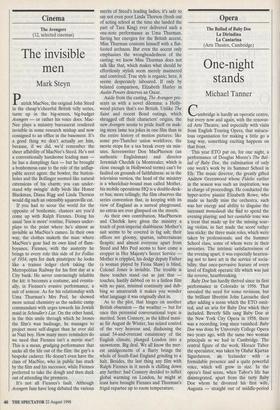Cinema
The Avengers (12, selected cinemas)
The invisible men
Mark Steyn
Patrick MacNee, the original John Steed in the cheap'n'cheerful British telly series, turns up in the big-screen, big-budget Avengers — or rather his voice does. Mac- Nee plays a ministry bureaucrat rendered invisible in some research mishap and now consigned to an office in the basement. It's a good thing we don't actually see him, because, if we did, we'd remember the sheer affability of MacNee's Steed. He's not a conventionally handsome leading man he has a dumplingy face — but he brought a bonhomous ease to the role of the unflap- pable secret agent: the bowler, the button- holes and the Bollinger seemed like natural extensions of his charm; you can under- stand why swingin' dolly birds like Honor Blackman, Diana Rigg and Linda Thorson would dig such an ostensibly squaresville cat.
If you had to scour the world for the opposite of bonhomie, chances are you'd come up with Ralph Fiennes. Doing his usual 'less is more' routine, Fiennes under- plays to the point where he's almost as invisible as MacNee's cameo. In their own way, the clothes maketh the man: where MacNee's gear had its own kind of flam- boyance, Fiennes, with the austerity he brings to every role this side of Ice Follies of 1934, opts for dark pinstripes: he looks like a trainee ledger clerk taking the Metropolitan Railway for his first day at a City bank. He never convincingly inhabits the kit: it becomes a costume, and eventu- ally, in Fiennes's evasive performance, a suit of armour. As for his relationship with Uma Thurman's Mrs Peel, he showed more sexual chemistry as the sadistic camp commandant with urges towards his Jewish maid in Schindler's List. On the other hand, in the thin smile through which he looses the film's wan badinage, he manages to project more self-disgust than he ever did as Nazi boy. How many more reminders do we need that Fiennes isn't a movie star? This is a mean, grudging performance that sucks all the life out of the film: the guy's a bespoke cadaver. He doesn't even have the class of MacNee, who in public has stuck by the film and his successor, while Fiennes preferred to take the dough and then duck out of attending the premiere.
It's not all Fiennes's fault. Although Avengers fans have long debated the various merits of Steed's leading ladies, it's safe to say not even poor Linda Thorson (fresh out of acting school at the time she landed the part of Tara King) ever delivered such a one-note performance as Uma Thurman. Saving her energies for the British accent, Miss Thurman contents himself with a flat- footed archness. But even the accent only emphasises the wrongheadedness of the casting: we know Miss Thurman does not talk like that, which makes what should be effortlessly stylish seem merely mannered and contrived. True style is organic; here, it seems desperately laboured. If only by belated comparison, Elizabeth Hurley in Austin Powers deserves an Oscar.
Aside from the casting, The Avengers pre- sents us with a novel dilemma: a Holly- wood picture that's too British. Unlike The Saint and recent Bond outings, which shrugged off their characters' origins, the new Avengers seems to pride itself on mak- ing more lame tea jokes in one film than in the entire history of motion pictures: like some pre-Thatcher union workforce, the movie stops for a tea break every six min- utes. Screenwriter Don MacPherson (an authentic Englishman) and director Jeremiah Chechik (a Montrealer, which is close enough in Hollywood terms) can't be faulted on grounds of faithfulness: as in the television version, the head of the ministry is a wheelchair-bound man called Mother, his mobile operations HQ is a double-deck- er bus; more tellingly, the film observes the series convention that, in keeping with its view of England as a surreal playground, no extras are ever glimpsed on the streets.
As their own contribution, MacPherson and Chechik have given the ministry a touch of post-imperial shabbiness: Mother's suit seems to be covered in fag ash; their offices are gloomy, spartan, subterranean fleapits; and almost everyone apart from Steed and Mrs Peel seems to have come a cropper in Her Majesty's Secret Service Mother is crippled, his dodgy deputy Father (a woman played by Fiona Shaw) is blind, Colonel Jones is invisible. The trouble is these touches stand out as just that touches, hastily dabbed on to a listless film with no pace, minimal continuity and dub- bing so amateurish it makes you wonder what language it was originally shot in.
As to the plot, that hinges on another British obsession — the weather — but for once this perennial conversational topic is merited. Sean Connery, as the kilted mani- ac Sir August de Winter, has seized control of the very heavens and, disdaining the usual 54-and-overcast consistency of the English climate, plunged London into a snowstorm. Big deal. We all know the mer- est smidgeonette of a flurry brings the whole of South-East England grinding to a halt. Besides, the last thing any film with Ralph Fiennes in it needs is chilling down any further: had Connery decided to inflict global warming on London, he might at least have brought Fiennes and Thurman's frigid repartee up to room temperature.
























































 Previous page
Previous page